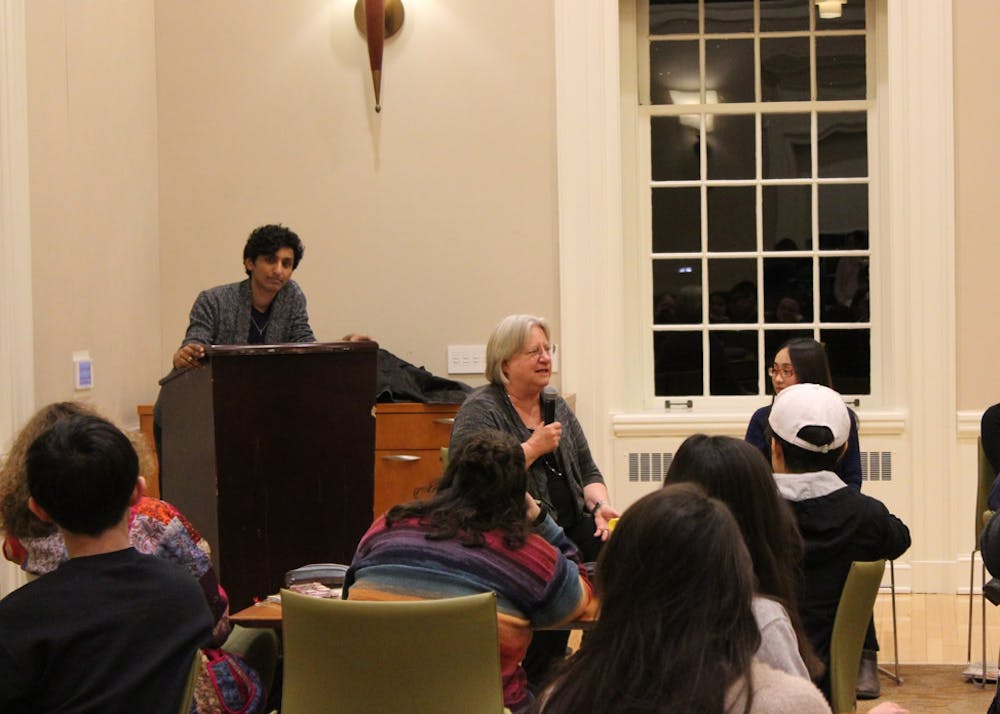The University’s celebration of Asian/Pacific American Heritage Month commenced with an LGBTQ Speaker Panel featuring four undergraduates, one doctoral student studying community psychology and one professor Monday in Newcomb Gallery.
The panel explored the experiences and difficulties of the intersectionality of ethnicity and the LGBTQ+ community and discussed Asian/Pacific American experiences in the LGBTQ+ community at the University.
This is the 31st year the University has celebrated cultures, traditions and histories of Asian American and Pacific Islanders in the United States with APAHM.
Although APAHM officially takes place in May throughout the U.S., the University chooses to celebrate in April in order to designate a full academic month to Asian/Pacific American culture and heritage.
The Asian Student Union is hosting 12 events throughout April as part of “APAHM 2019: Subtle Asian Heritage.” The name APAHM this year is a play off of a Facebook group and meme page created by Asian Australians that has rose to prominence within the Asian community all around the world in the last year.
The events this month intend to discuss what makes up Asian/Pacific American identity and explore many different aspects of Asian and Pacific Islander American heritage.
There are a wide array of events, such as “Dancing for Diversity,” a discussion of “Asian-American Millennials,” and lantern lighting on the lawn. Other organizations such as the Multicultural Student Center, Third Year Council and are co-sponsoring many of the events.
Monday’s event was hosted by the ASU and co-sponsored by both the Third Year Council and QC. There were barely any chairs left in the Newcomb Gallery after 50 students gathered for two hours to hear the six members discuss their experiences.
Many of the prepared questions asked focused on obstacles faced by being both Asian/Pacific American and a part of the LGBTQ+ community.
When asked about difficulties faced by being both Asian and LGBTQ+, one fourth-year panelist responded by saying that their experiences have been complicated and “unfortunately been kind of negative.”
“I think for me what I’ve realized is the intersection of my sexuality with my ethnicity is interesting because ethnicity is something that is so external and visual,” the panelist said. “It’s weird being Asian and queer and having one identity so externally stereotyped, while on the other hand having this other part, which is just as valid a part of me, that no one can see unless I do something or act in a way that is queer or tell someone.”
The panelists also spoke on the topic of resources at the University for Asian/Pacific American LGBTQ+ students. One undergraduate panelist said that resources at the University are “still not great,” but students are working to change that reality.
Another undergraduate panelist brought up the issue of the physical space the Multicultural Student Center and the LGBTQ center occupy and what the University can do to fix that.
“The MSC and LGBTQ center are located in similar spaces,” the panelist said. “It’s windowless and tucked away in the corner. Obviously, it’s probably for the convenience of space, but there’s obviously symbolism that people in those communities find … in sort of repressive in a way.”
The student went on to discuss how both the Asian Leaders Council and the LGBTQ+ community is trying to push for an opening of these spaces that is more accessible to people.
Charlotte Patterson, a professor of psychology in the Center for Children, Families and the Law and the director of the Women, Gender and Sexuality program, praised the student panelists who shared their stories and experiences. Prof. Patterson emphasized the importance of openness to learning about one another.
“As young people you have a lot to teach U.Va., and to make U.Va. a better place,” Prof. Patterson said. “I think that’s a very exciting prospect that you all raised tonight and I applaud you for that. Thank you.”
Karl Keat, a third-year College student and outgoing ASU president, said that unfortunately there have not been too many international events between the Asian/Pacific American community at the University and the LGBTQ+ community.
“We hope that it’s the first of many,” Keat said. “There’s a lot of discussion that goes on about the LGBTQ experience and the Asian/Pacific American experience in vacuums, but really there are a lot of unique issues faced by Asian American and even Asian international students within the LGBTQ community. So, we hope to highlight that with a panel of diverse speakers from different backgrounds.”
Keat added that the Asian/Pacific American community is the largest minority group on Grounds, but often times does not feel like it. Asian-American students made up 14.56 percent of the University’s student body in 2018 — the largest of any minority group.
“The APA community is sort of insulated from the broader U.Va. community at times,” Keat said. “A lot of the students within the community mostly restrict themselves to the cultural organizations that are associated with it.”
The University and ASU’s APAHM celebration hopes to celebrate and raise awareness of the diverse issues the Asian/Pacific American community faces.
“[The Asian/Pacific American Community] is a really diverse community with a lot of different ethnic groups within it that face very different problems and have very different cultures,” Keat said. “[APAHM] is a good chance to showcase not only the similarities between us, but also some of the subtle differences between our cultures.”







